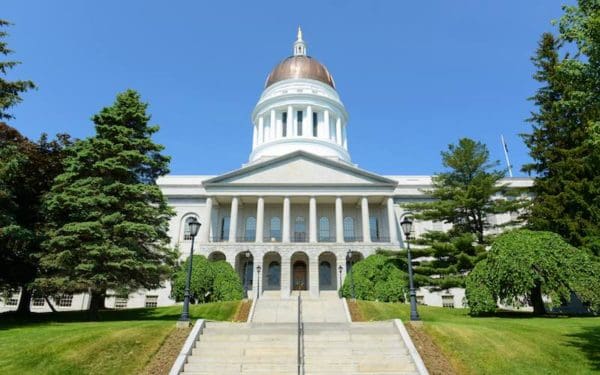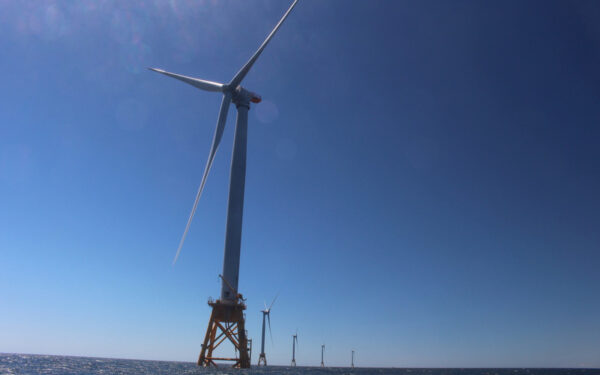
The Northern Pass project has faced strong opposition since it was first proposed; as it reaches a major milestone in its permitting process, that opposition is as strong and sustained as ever. Photo: Aryut Tantisoontornchai/Shutterstock
The Northern Pass transmission project proposes to bring electricity generated from Canadian dams to southern New England. But it will come at a tremendous cost to New Hampshire through the damage it would do to the environment and communities along its 192-mile path.
Granite Staters have opposed the project since it was first rolled out eight years ago. In the time since then, the proposal has been subject to regulatory review processes at the state and federal levels. Also in that time, various competitors have come forward with their own transmission project proposals that are less damaging to the environment and more cost-effective overall.
And, while New England’s energy landscape has morphed in various ways over the years, what has remained constant is strong opposition to Northern Pass from residents throughout New Hampshire, from cities and towns up and down the proposed transmission route, and from grassroots and environmental organizations like CLF.
The fact is, Northern Pass is not needed. The proposed project is a dinosaur and it’s time for state regulators to pull the plug on this proposal for good. You can help as the project nears a significant milestone: the conclusion of its review process with the New Hampshire Site Evaluation Committee.
New Hampshire Continues to Scrutinize the Project
In May of 2017, the New Hampshire Site Evaluation Committee finally began a months-long series of hearings to guide its decision whether to grant Northern Pass state-level approval – specifically, whether to issue a permit to site and construct the line in New Hampshire. The hearings have involved more than 150 intervenors who will be impacted by the project. They have also involved dozens of expert witnesses both for and against the proposal.
CLF intervened and has been engaged in this lengthy process, working with our partners to show that Northern Pass is neither necessary nor in the public interest, and must be rejected.
Final hearings are now anticipated this month and, following the opportunity for briefing by the parties that intervened, a decision is expected before the end of March.
Please, share your own views with the Site Evaluation Committee before their hearings close. You can do so by emailing the Site Evaluation Committee’s Administrator, Pamela Monroe, at Pamela.Monroe@sec.nh.gov no later than December 21, 2017.
New England Doesn’t Need Northern Pass
While the Site Evaluation Committee process has moved forward in New Hampshire, important events also have taken place in Massachusetts, the main customer for Northern Pass’s electricity. In 2016, the Commonwealth passed legislation to purchase more renewable energy and earlier this year, it put out a request for bids to companies to provide that energy.
CLF advocated for provisions in this bidding process to prevent Massachusetts from favoring projects like Northern Pass that are wholly dependent on large-scale Canadian hydropower, which is not as clean as its proponents claim. As a result, Massachusetts established a clear policy preference for projects that combine hydroelectric power with wind energy.
In July, more than 40 projects were proposed in response to the Commonwealth’s request – some with no hydropower at all, some with a blend of wind energy and hydropower, and a few consisting solely of hydro.
Northern Pass Has Proposed a Second Power Source to Get In on Massachusetts Bidding
Northern Pass was among those submitting proposals, but they offered not one, but two proposals. One is a “hydroelectric only” bid (in other words, the project currently under consideration by the New Hampshire Site Evaluation Committee). The second is a “hybrid” project that would transmit both hydroelectric power and wind energy.
The problem? This is the first time that anyone has even heard of this “hybrid” project. Yet in its bid, Northern Pass claims that the hybrid project will receive approvals from state and federal agencies within weeks. How is that possible? We can only speculate that Northern Pass hopes that if Massachusetts selects this hybrid project in its bidding process, New Hampshire regulators will allow the new proposal to move forward without due diligence – and without the opportunity for communities and stakeholders to weigh in.
We’re not letting Northern Pass get away with this misrepresentation. CLF has filed a letter with the Massachusetts project selection committee making clear that Northern Pass has no permit requests pending for this hybrid proposal. We’ve also let New Hampshire regulators know about this misrepresentation.
Massachusetts is expected to announce successful bids by January 2018 at the latest. The selected project or projects will then go through a review process with the state’s Department of Public Utilities.
Meanwhile, the Department of Energy Has Handed Northern Pass a Permit
Northern Pass also needs federal permits to build from the Department of Energy and the U.S. Forest Service. CLF engaged closely with these two agencies during their review process. In particular, we commented extensively on major deficiencies in the federal review of the project’s environmental impacts. These deficiencies include a deeply flawed analysis of alternatives to Northern Pass, a failure to assess impacts associated with the hydroelectric power it proposes to transmit, and flawed assumptions preventing a valid assessment of the transmission line’s impacts on the landscapes it will cross.
On November 16, the Department of Energy issued a record of decision adopting the review contained in its Final Environmental Impact Statement and a permit allowing Northern Pass’s border crossing. Regrettably, the decisions come as no surprise because, from the beginning, it appeared the Department of Energy would be applying a rubber stamp. CLF is assessing our options for challenging these decisions.
At the same time, the Forest Service has been determining whether to grant a special-use permit so the project can cross the White Mountain National Forest. It recently issued a draft Record of Decision to grant such a permit. CLF, the Society for the Protection of New Hampshire Forests, and the Appalachian Mountain Club have all filed objections, forcing further consideration by the agency.
Don’t Believe the Northern Pass “Spin” that It’s a Done Deal
Unsurprisingly, Northern Pass wasted no time touting the Department of Energy’s recent decision as confirmation of the benefits of its project. It also continues to assert that it will have all approvals in hand in 2017. We know – based on the New Hampshire Site Evaluation Committee’s schedule – that this is simply not true. For Northern Pass, the path has already been a long one. But much as Northern Pass would like to believe otherwise, it’s not out of the woods.
Next Steps: You Can Help in New Hampshire
The Northern Pass proposal has many moving parts, but right now the New Hampshire Site Evaluation Committee process is our immediate focus. We urge you again to share your own views with the Site Evaluation Committee before the case closes. You can do so by emailing the Site Evaluation Committee’s Administrator, Pamela Monroe, at Pamela.Monroe@sec.nh.gov no later than December 21, 2017.
We need to be more vigilant than ever now that the Northern Pass proposal is getting closer to an up or down vote at the New Hampshire Site Evaluation Committee. Thank you for speaking up and working with us to ensure that this outdated project is stopped before it can do irreparable damage to our environment and our communities.




